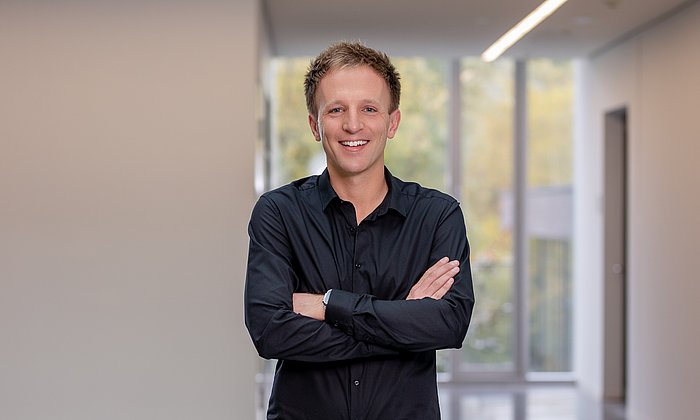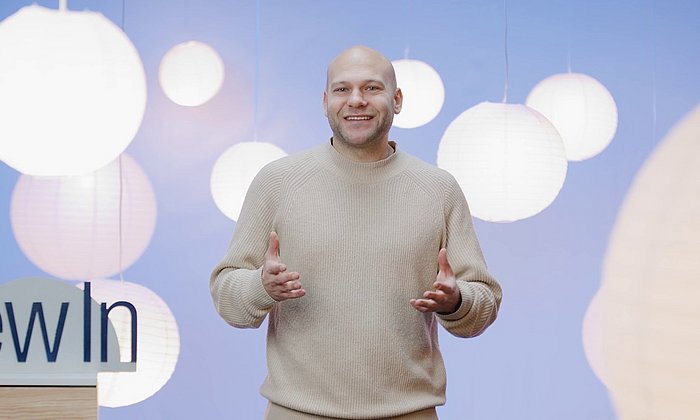NewIn: Boris Paal
Shaping technology development with legal frameworks
Hundred-year-old legal texts, commentaries spanning thousands of pages – it’s not uncommon for the legal sciences to survey the work of generations as standards and interpretations develop over decades. Boris Paal operates on a different time scale. For example after the ‘ChatGPT moment’. “When the large language models entered public consciousness with a thunderclap, I was surprised myself how few answers we had as legal scholars,” says Paal, who holds the Chair for Law and Regulation of the Digital Transformation. “Which data can we legally feed into the AI training process, what output is allowed and in what form, and what is even happening inside these AI systems? Does the output still represent personal data, subject to data protection laws, or does it consist only of probability values?”
This has opened up a bundle of new research topics for legal scholars who, like Paal, study legal aspects of IT, data, AI and media. Due to the rapid pace of technological trends, these are questions that need quick answers. In many cases, however, researchers lack solid legal foundations or precedents to guide their efforts. “We’re moving on terrain that is a bit more unsteady and changeable than in other legal fields,” says Paal. “The nice thing: Where everything is new, there is a lot of scope to shape change and make things happen. In that sense, it is exciting for students to have a ringside seat as new laws are formulated.”
Paal’s status is not only unusual in research, but also in teaching. Most of the students he teaches are not studying in his field. Apart from some LMU law students, his lectures are attended mostly by IT, engineering and political science students.
Judge at Hamburg Regional Court
The move to join a university without a law department or a legal studies program was a conscious decision for Paal. “I came to TUM to engage in interdisciplinary work at an international level, to learn a lot about technological developments when they are new, and to be involved in dynamic change processes at the earliest possible stage.” This could promote the success of what Paal sees as a central task of legal experts. “I see myself as an enabler and shaper, and not as a nitpicker and blocker who points out what can’t be done only when the completed technology is on the table.”
A key pillar of his work is therefore interdisciplinary projects in which he delivers the legal perspective so that the technological developments include the decisive legal issues from the outset. Alongside this, there is the classical legal pillar involving the interpretation of existing law and proposals for new regulations – and where Paal sometimes advocates a more considered approach despite the need for decisive action. “In recent years numerous new laws on the digital transformation have been passed on the European level such as the Data Act and AI Act. This legislation must now be implemented by the member states, applied by the authorities and interpreted by the courts. At the same time we are already seeing discussions on whether more laws are needed. I think that, for the moment, we should look at what is and isn’t working – and then take any corrective action that may be necessary.”
In his work Boris Paal can make use of his experience as a part-time judge at the Hamburg Regional Court, one of the first courts in Germany with a chamber dedicated to IT law. “As a researcher I am mainly concerned with material law, in other words what is permitted, required or prohibited. As a judge the question also arises of how to implement this in court proceedings. That has been an enriching experience.”
Working with ministries, companies and start-up teams
Paal came to Munich through an appointment to a so-called lighthouse professorship, following stints at universities in Constance, Oxford, Heidelberg, Freiburg and Leipzig, among others. At TUM the third pillar of his work is also very important to him. This is the transfer of his research results into practice, for which he works in a wide range of formats: in so-called sandboxes where he works with ministries to formulate laws; in the TUM Think Tank, where research, the justice system, policy makers and companies engage in an intensive exchange of ideas; in the TUM Institute for LifeLong Learning, where he gives courses on legal issues related to AI applications and on strategic legal innovation; and in the Legal Tech Colab and in student projects, where he advises start-ups on the legal framework relevant to their business ideas.
A decisive principle for Paal in this work: “We have to do both: protect fundamental rights and facilitate innovations. An example is medical research, where the analysis of large quantities of data can benefit society as a whole. But individual data must still be protected. I see it as an important and exciting aspect of my work to find the right balance between these considerations.”
Technical University of Munich
Corporate Communications Center
- Klaus Becker
- klaus.becker@tum.de
- presse@tum.de
- Teamwebsite


